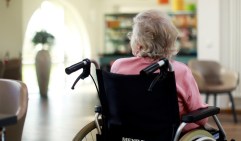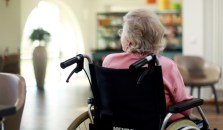As of June 15, 2020, 34% of Michigan's Covid deaths had taken place in nursing homes. “The bill, which was approved by the House 74-34, bans nursing homes from admitting or retaining an individual starting Sept. 1 who tests positive for COVID-19 unless the person had recovered or unless a nursing home could provide care in a separate building. Seventeen Democrats joined Republicans in approving the bill” which Whitmer is expected to veto.
7/22/20, “Michigan House OKs bill keeping COVID-19 patients out of nursing homes," Detroit News, Beth LeBlanc
 “The Michigan House approved Wednesday a bill that would direct elderly people with COVID-19 away from nursing homes and into designated care facilities, a challenge to Gov. Gretchen Whitmer’s nursing home order. [Whitmer
has designated 21 existing nursing homes to take “overflow.” The
problem is they’re often substandard as June 23 article below
describes. They were “chosen” to be “hubs” because they have available beds. High quality facilities have waiting lists to get in].
“The Michigan House approved Wednesday a bill that would direct elderly people with COVID-19 away from nursing homes and into designated care facilities, a challenge to Gov. Gretchen Whitmer’s nursing home order. [Whitmer
has designated 21 existing nursing homes to take “overflow.” The
problem is they’re often substandard as June 23 article below
describes. They were “chosen” to be “hubs” because they have available beds. High quality facilities have waiting lists to get in]. If the Senate concurs on the bill, the legislation would be sent to Whitmer, where she is expected to veto it.
The bill, which was approved by the House 74-34, bans nursing homes from admitting or retaining an individual starting Sept. 1 who tests positive for COVID-19 unless the person had recovered or unless a nursing home could provide care in a separate building. Seventeen Democrats joined Republicans in approving the bill.
.......
 Nursing homes unable to provide care in a separate building would need to move the resident to a field hospital, a facility used during a hospital’s surge capacity or a “dedicated facility.” The policy would apply only to those individuals inadmissible to a hospital.
Nursing homes unable to provide care in a separate building would need to move the resident to a field hospital, a facility used during a hospital’s surge capacity or a “dedicated facility.” The policy would apply only to those individuals inadmissible to a hospital.
The departments of Health and Human Services and Licensing and Regulatory Affairs would need to create at least one “dedicated facility” per the state’s eight health care regions by Sept. 1.
The bill also requires HHS and LARA by Aug. 15 to evaluate the effectiveness of 21 regional hubs designated by Whitmer earlier this year to take infected individuals for whom nursing homes did not believe they could provide care.
The bill also requires HHS and LARA by Aug. 15 to evaluate the effectiveness of 21 regional hubs designated by Whitmer earlier this year to take infected individuals for whom nursing homes did not believe they could provide care.
Democratic Rep. Leslie Love of Detroit has been a proponent for change in Michigan’s nursing home policy during the pandemic, but she criticized the bill. She said the legislation was rushed and left too many loose ends regarding the required transfer and the mandates for “designated facilities.”
“It’s problematic. It’s not reasonable. It’s unfair. It’s dense,” Love said.
“We have the talent. We have the answers right here in this chamber. We don’t have to take a Senate bill,” she said.
Republican Rep. Luke Meerman of Coopersville urged the legislation’s passage, arguing that Whitmer’s policy had done “nothing other than increase the vulnerability of our elderly population.”
“While this is an issue that should have never occurred, the time is long overdue to correct this massive problem that the administration has created,“ Meerman said.
In her executive orders related to nursing homes, Whitmer has directed nursing homes to house elderly COVID-19 patients in either an isolated area of a nursing home [assuming such extra space exists] or one of 21 regional hubs equipped to care for and isolate people with COVID-19.
Whitmer’s policy has been criticized out of fears that the policy spurred the spread of COVID-19 by allowing infected individuals back into nursing homes ill-equipped to isolate and care for them.”
………………………………….. “It’s problematic. It’s not reasonable. It’s unfair. It’s dense,” Love said.
“We have the talent. We have the answers right here in this chamber. We don’t have to take a Senate bill,” she said.
Republican Rep. Luke Meerman of Coopersville urged the legislation’s passage, arguing that Whitmer’s policy had done “nothing other than increase the vulnerability of our elderly population.”
“While this is an issue that should have never occurred, the time is long overdue to correct this massive problem that the administration has created,“ Meerman said.
In her executive orders related to nursing homes, Whitmer has directed nursing homes to house elderly COVID-19 patients in either an isolated area of a nursing home [assuming such extra space exists] or one of 21 regional hubs equipped to care for and isolate people with COVID-19.
Whitmer’s policy has been criticized out of fears that the policy spurred the spread of COVID-19 by allowing infected individuals back into nursing homes ill-equipped to isolate and care for them.”
Added: Whitmer’s “21 hubs:” In the 5 star rating system, 3 have one star, 6 have two stars, one has no rating at all because it’s in a group with persistent past problems. “High-performing nursing homes usually have waiting lists, said Salli Pung, the state of Michigan’s long-term care ombudsman. Pung said her understanding is only facilities with open beds could serve as hubs. That could be a reason why facilities with lower ratings got picked, according to multiple officials watching the situation….Statewide, 33% of nursing homes in Michigan have one-star or two-star ratings.”
 June 23, 2020, “Michigan hubs picked to care for COVID-19 seniors have low quality ratings," Detroit News, Craig Mauger, Lansing
June 23, 2020, “Michigan hubs picked to care for COVID-19 seniors have low quality ratings," Detroit News, Craig Mauger, Lansing
“Nearly half of the nursing homes that Michigan selected to serve as regional hubs to care for elderly individuals with COVID-19 have below-average quality ratings from the federal government.
The regional hubs--21 nursing homes picked to help house people with the novel coronavirus--are a core component of Gov. Gretchen Whitmer’s plan for attempting to safeguard long-term care facilities. The hubs can care for individuals discharged from hospitals or from other nursing homes that can’t properly isolate a resident with COVID-19.
Of the 21 hubs, six have two-star quality ratings out of five stars — described as below average — from the Centers for Medicare and Medicaid Services, and three have one-star quality ratings — described as much below average. A 10th regional hub facility doesn’t have a rating because it’s in a program for facilities with persistent past problems, according to the federal government.
The ratings are based on health inspections, staffing and other quality measures, according to the Centers for Medicare and Medicaid Services. They are meant “to help consumers, their families, and caregivers compare nursing homes more easily and to help identify areas about which you may want to ask questions,” according to a 2019 press release.
The regional hubs--21 nursing homes picked to help house people with the novel coronavirus--are a core component of Gov. Gretchen Whitmer’s plan for attempting to safeguard long-term care facilities. The hubs can care for individuals discharged from hospitals or from other nursing homes that can’t properly isolate a resident with COVID-19.
Of the 21 hubs, six have two-star quality ratings out of five stars — described as below average — from the Centers for Medicare and Medicaid Services, and three have one-star quality ratings — described as much below average. A 10th regional hub facility doesn’t have a rating because it’s in a program for facilities with persistent past problems, according to the federal government.
The ratings are based on health inspections, staffing and other quality measures, according to the Centers for Medicare and Medicaid Services. They are meant “to help consumers, their families, and caregivers compare nursing homes more easily and to help identify areas about which you may want to ask questions,” according to a 2019 press release.
“Effort was made to look at factors well beyond CMS star ratings, as those are based largely on self-reported information by the facility and may provide a glimpse into the facility, but do not provide a full picture,” said Lynn Sutfin, spokeswoman for the Michigan Department of Health and Human Services.
But the ratings are drawing the attention of state lawmakers, including Love, who’s working with a group of Democrats to examine state nursing home policies during the pandemic.
“It’s problematic,” Love said of the regional hubs’ ratings Tuesday.
Love and the Democratic task force are working on legislation that would bar nursing homes with one-star or two-star ratings from the Centers for Medicare and Medicaid Services from being regional hubs.
Employees of some of the hubs have also voiced concerns about what’s happening inside the facilities, even those with higher ratings.
An employee of Regency at St. Clair Shores, which received an above-average rating, said Tuesday that her facility is short-staffed and the same dietary carts are being used for residents of the COVID-19 isolation area and residents without the virus.
The employee, who declined to be identified for fear of retaliation, said she understands the concerns family members have about residents’ safety.
“I know they’re worried about their loved ones,” the employee said.
In a statement, Regency at St. Clair Shores said the facility has had and continues to have the required supply of personal protective equipment for its staff and residents. The facility also follows the guidelines for all facility operations, including the use and laundering of linens and the use of kitchen equipment, and any allegations to the contrary are untrue, the statement said.
“Our team has worked tirelessly to care for and protect the residents of Regency at St. Clair Shores and will continue to do so. We are committed to provide high-quality care and support to our residents and their families,” the statement said.
Other hubs about which The Detroit News found complaints didn’t return requests for comment.
Sen. Lana Theis, R-Brighton, serves on the Senate Oversight Committee, which has taken about five hours of testimony in recent weeks on the state’s nursing home policies. Many Republican lawmakers have called on Whitmer to set up entirely separate facilities to care for nursing home residents with COVID-19.
Theis said she finds the low rating of the regional hubs “terrifying” because the hubs should feature the most experienced people ready to take on the serious problem the state is facing.
“That’s not what happened,” she said.
Virus in nursing homes
As of June 15, the state had tracked 1,947 COVID-19 deaths among nursing home residents and 20 deaths among staff. The numbers gained attention from lawmakers in Lansing and Washington, D.C., and amounted to 34% of the statewide COVID-19 death toll at that point.
On Tuesday, the 21 regional hubs, about 5% of the more than 440 nursing facilities in Michigan, had reported 214 COVID-19 deaths, about 11% of the nursing home total, according to currently available state data.
Whitmer’s administration launched the regional hub program in April, weeks after the state confirmed its first cases of COVID-19 on March 10. The hubs were set up to provide exclusive or isolated space to care for individuals with COVID-19, separate from other residents without the virus in the facilities.
According to the state, 47 nursing homes inquired about being designated as a regional hub. Of those, 22 hubs were approved, with one of the facilities later withdrawing.
The hubs were selected based on factors that included willingness to serve, proximity to acute care facilities experiencing high COVID-19-related demand, ability to effectively quarantine residents, performance history and capacity, Sutfin said.
Under the state’s regional hub program, the selected hubs receive $5,000 per approved bed and a $200-per-day payment for any occupied hub bed. That’s on top of any additional funding the hubs would receive for patient care.
“It’s problematic,” Love said of the regional hubs’ ratings Tuesday.
Love and the Democratic task force are working on legislation that would bar nursing homes with one-star or two-star ratings from the Centers for Medicare and Medicaid Services from being regional hubs.
Employees of some of the hubs have also voiced concerns about what’s happening inside the facilities, even those with higher ratings.
An employee of Regency at St. Clair Shores, which received an above-average rating, said Tuesday that her facility is short-staffed and the same dietary carts are being used for residents of the COVID-19 isolation area and residents without the virus.
The employee, who declined to be identified for fear of retaliation, said she understands the concerns family members have about residents’ safety.
“I know they’re worried about their loved ones,” the employee said.
In a statement, Regency at St. Clair Shores said the facility has had and continues to have the required supply of personal protective equipment for its staff and residents. The facility also follows the guidelines for all facility operations, including the use and laundering of linens and the use of kitchen equipment, and any allegations to the contrary are untrue, the statement said.
“Our team has worked tirelessly to care for and protect the residents of Regency at St. Clair Shores and will continue to do so. We are committed to provide high-quality care and support to our residents and their families,” the statement said.
Other hubs about which The Detroit News found complaints didn’t return requests for comment.
Sen. Lana Theis, R-Brighton, serves on the Senate Oversight Committee, which has taken about five hours of testimony in recent weeks on the state’s nursing home policies. Many Republican lawmakers have called on Whitmer to set up entirely separate facilities to care for nursing home residents with COVID-19.
Theis said she finds the low rating of the regional hubs “terrifying” because the hubs should feature the most experienced people ready to take on the serious problem the state is facing.
“That’s not what happened,” she said.
Virus in nursing homes
As of June 15, the state had tracked 1,947 COVID-19 deaths among nursing home residents and 20 deaths among staff. The numbers gained attention from lawmakers in Lansing and Washington, D.C., and amounted to 34% of the statewide COVID-19 death toll at that point.
On Tuesday, the 21 regional hubs, about 5% of the more than 440 nursing facilities in Michigan, had reported 214 COVID-19 deaths, about 11% of the nursing home total, according to currently available state data.
Whitmer’s administration launched the regional hub program in April, weeks after the state confirmed its first cases of COVID-19 on March 10. The hubs were set up to provide exclusive or isolated space to care for individuals with COVID-19, separate from other residents without the virus in the facilities.
According to the state, 47 nursing homes inquired about being designated as a regional hub. Of those, 22 hubs were approved, with one of the facilities later withdrawing.
The hubs were selected based on factors that included willingness to serve, proximity to acute care facilities experiencing high COVID-19-related demand, ability to effectively quarantine residents, performance history and capacity, Sutfin said.
Under the state’s regional hub program, the selected hubs receive $5,000 per approved bed and a $200-per-day payment for any occupied hub bed. That’s on top of any additional funding the hubs would receive for patient care.
High-performing nursing homes usually have waiting lists, said Salli Pung, the state of Michigan’s long-term care ombudsman. Pung said her understanding is only facilities with open beds could serve as hubs.
That could be a reason why facilities with lower ratings got picked, according to multiple officials watching the situation.
“We have not heard complaints directly related to the hub units,” Pung said last week. “We have heard from many family members concerned about the hubs’ potential for introducing COVID to existing residents by admitting COVID-positive residents.”
As for the federal quality ratings, Sutfin, the state department of health spokeswoman, cited a 2016 report from the U.S. Government Accountability Office that found the formula for determining the ratings “is not intuitive, which can make interpreting overall ratings difficult for consumers by both complicating the comparison of overall ratings and masking the importance of the component ratings.”
“Not all facilities that requested regional hub designation were ultimately approved,” Sutfin added. “Notably, facilities with recent infection control citations, abuse citations, and/or structural challenges that could compromise safe isolation were not approved for regional hub designation.”
Concerns about ratings
There are inconsistencies within the federal government’s five-star rating, said Melissa Samuel, president and CEO of the Health Care Association of Michigan, which represents nursing homes. The system has a degree of subjectivity and a weighted curve to the ratings, she said.
“It is one measure of a nursing facility. There are many other factors that impact the quality of care provided,” Samuel added….
But there are still concerns about whether nursing homes have enough staffing and personal protective equipment more than 100 days after the state confirmed its first cases of COVID-19.
“We haven’t seen that across the board,” said Andrea Acevedo, president of Service Employees International Union Healthcare Michigan, of sufficient staffing and access to personal protective equipment.
SEIU Healthcare Michigan represents about 8,000 nursing home workers.
Acevedo called for a meeting of the Whitmer administration, the nursing home industry and the union to talk about the standard of care and the situation in the facilities. Such a meeting hasn’t happened yet, she said.”
...........

No comments:
Post a Comment